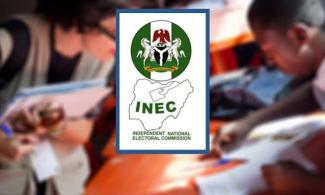
The group noted that Nigeria could be an enviable reference point in the elections in African countries if the concept was introduced and maintained.
A civic group, the Global Coalition for Security and Democracy in Nigeria (GCSDN) has called for the configuration of voter's cards with the National Identification Number and the SIM cards of telephones to eliminate electoral violence and increase transparency in the Nigerian Electoral management.
The group gave the advice in an open letter titled: "Vote From Home: The Need to Configure Nigeria's Voter's Cards with Telephone SIM cards and the National Identification Number."
The letter was addressed to the Ministers of Interior, Mr Olubunmi Tunji-Ojo; Communications, Innovation and Digital Economy, Dr. 'Bosun Tijani, and Chairman of the Independent National Electoral Commission, Professor Mahmood Yakubu and the Director of the National Identity Management Commission, Mr Abisoye Coker-Odusote.
The group argued that the introduction of electronic voting whereby Nigerians could use their phones to vote, would not only reduce the incidences of violence during elections but would also reduce the cost of election management in the country.
The open letter, dated March 17, 2024, was signed by the GCSDN's Global Coordinator, Comrade Frederick Odorige.
Decrying the killing and injuring of hundreds of Nigerians during elections, which had increased voters' apathy, the group explained that the 205.4 million cellular mobile connections in Nigeria are more than thrice the 93,469,008 number of registered voters.
It regretted that due to voters` apathy, only 25,286,616 voted at the presidential elections out of the eligible 93,469,008 registered voters, representing about 28.63 percent.
"At a period when the government is linking our National Identification Number with our BVN and telephone numbers, it will be an opportunity to use the same biometric medium to take our elections to a higher level in line with the Renewed Hope agenda of the government."
It partly read: "I wish to suggest that you should cooperate and configure our voter's cards with our National Identification Number and the SIM cards of our telephones. In that way, Nigerians will be able to vote with their mobile phones from the comforts of their homes and any location. Electronic voting matched with real-time transmission and display of results by an articulate electoral umpire could achieve efficient and effective electioneering.
"We believe that such a concept will bring the needed innovation to our election. It will remove the ballot paper and boxes system from our elections; remove election violence and the restriction of movements on election day; reduce the number of local and international observers and drastically reduce the high cost of organising elections both for INEC and the political parties."
It added, "Our security officers will also be relieved of the dangers and the work of mobilising to secure elections.
"In rural areas where our compatriots do not have mobile phones, INEC could provide special mobile phones at specially designated polling stations which registered voters could use. Since the Bimodal Voter Accreditation Machines (BVAS) have been acquired, they could be sent abroad to our 109 missions, 76 embassies, 22 high commissions, and 11 consulates globally, in preparation for future diaspora voting.
"It is sad that over the years, hundreds of our compatriots have been killed or injured during elections. Voters' apathy has also increased. The 205.4 million cellular mobile connections in Nigeria has more than thrice the 93,469,008 number of registered voters. Due to voters` apathy, only 25,286,616 voted at the presidential elections out of the eligible 93,469,008 registered voters – about 28.63 percent.
"It is possible to put an end to these aberrations while placing our country in a better international limelight. Elections are the cornerstones of democracy. Therefore, we believe that, for our democracy to thrive, we must tailor our elections along the lines of our realities through innovative governance."
The group further noted that Nigeria could be an enviable reference point in the elections in African countries if the concept was introduced and maintained.
"Electronic voting and electronic transmission of results in real-time is what our country needs. It is possible to correct previous errors and reignite the trust and expectations of our compatriots in our future elections."
Follow the Sahara Reporters channel on WhatsApp: https://whatsapp.com/channel/0029VaFClvtH5JM6SSsP7M2Y